
Mbouda: A Hidden Gem in the Highlands of Cameroon
Nestled in the verdant highlands of Cameroon, Mbouda is a city that offers a unique blend of natural beauty, cultural richness, and warm hospitality. It is located in the western region of the country, surrounded by rolling hills and lush landscapes, making it an ideal destination for nature lovers and adventure seekers alike. As you explore Mbouda, you will be charmed by its vibrant markets, where local vendors sell fresh produce, traditional crafts, and colorful textiles. The bustling atmosphere of these markets provides a glimpse into the daily lives of the local people and offers an opportunity to purchase unique souvenirs to take back home. One of the highlights of visiting Mbouda is the chance to experience the traditional music and dance of the Bamileke people. The rhythmic beats of the drums and the graceful movements of the dancers are a testament to the rich cultural heritage of the region. Don't miss the opportunity to attend a local festival or celebration, where you can witness these captivating performances firsthand. For those who enjoy outdoor activities, the surrounding area offers numerous hiking trails that lead to stunning viewpoints and waterfalls. The cool climate and scenic beauty make it a perfect escape from the hustle and bustle of city life. Whether you are exploring the forests, visiting local farms, or simply relaxing and taking in the views, Mbouda provides a serene and enriching experience for all who visit.
Local tips in Mbouda
- Visit the local markets early in the morning for the freshest produce and the best selection of crafts.
- Carry a light jacket as the highland climate can be cool, especially in the evenings.
- Hire a local guide for hiking trips to gain better insights and ensure a safe journey.
- Attend a traditional Bamileke dance performance to fully experience the local culture.
- Try the local cuisine, especially dishes made with fresh ingredients from the surrounding farms.
Mbouda: A Hidden Gem in the Highlands of Cameroon
Nestled in the verdant highlands of Cameroon, Mbouda is a city that offers a unique blend of natural beauty, cultural richness, and warm hospitality. It is located in the western region of the country, surrounded by rolling hills and lush landscapes, making it an ideal destination for nature lovers and adventure seekers alike. As you explore Mbouda, you will be charmed by its vibrant markets, where local vendors sell fresh produce, traditional crafts, and colorful textiles. The bustling atmosphere of these markets provides a glimpse into the daily lives of the local people and offers an opportunity to purchase unique souvenirs to take back home. One of the highlights of visiting Mbouda is the chance to experience the traditional music and dance of the Bamileke people. The rhythmic beats of the drums and the graceful movements of the dancers are a testament to the rich cultural heritage of the region. Don't miss the opportunity to attend a local festival or celebration, where you can witness these captivating performances firsthand. For those who enjoy outdoor activities, the surrounding area offers numerous hiking trails that lead to stunning viewpoints and waterfalls. The cool climate and scenic beauty make it a perfect escape from the hustle and bustle of city life. Whether you are exploring the forests, visiting local farms, or simply relaxing and taking in the views, Mbouda provides a serene and enriching experience for all who visit.
When is the best time to go to Mbouda?
Iconic landmarks you can’t miss
Chutes de la Métché
Discover the breathtaking Chutes de la Métché in Cameroon: a blend of natural beauty, cultural significance, and historical depth.
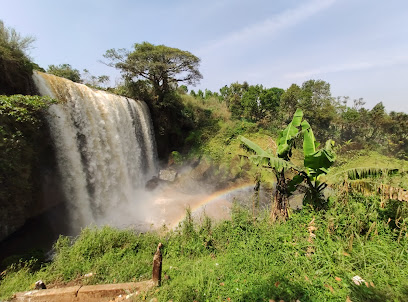
Porte D'entrée Foumban
Discover the heart of Bamoun culture at Porte D'entrée Foumban, a gateway to Cameroon's rich artistic and historical legacy.
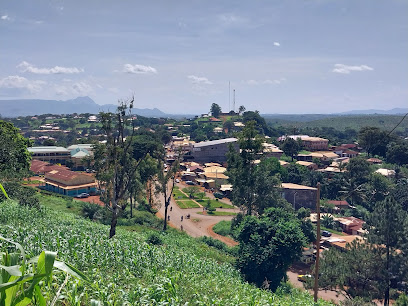
Place des Fêtes de Mbouda
Discover Place des Fêtes de Mbouda: A serene garden oasis in Cameroon, perfect for relaxation and cultural immersion. Explore lush landscapes and vibrant events.
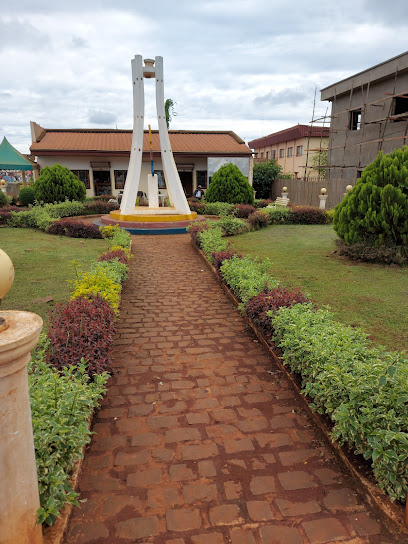
Monument WANKO
Explore Monument WANKO in Bafoussam, an iconic landmark honoring Cameroon's history and the legacy of Samuel Wanko.
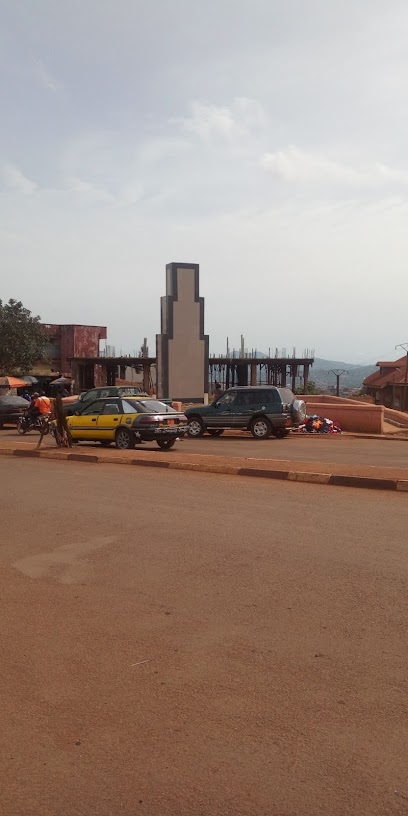
Unmissable attractions to see
Chutes de la Métché
Explore the breathtaking Chutes de la Méthché, a stunning waterfall in Cameroon surrounded by lush landscapes and rich biodiversity.
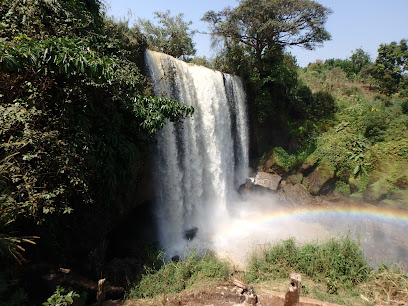
Place des Fêtes de Mbouda
Discover the serene beauty of Place des Fêtes de Mbouda, a lush garden oasis perfect for relaxation and cultural immersion in the heart of Cameroon.
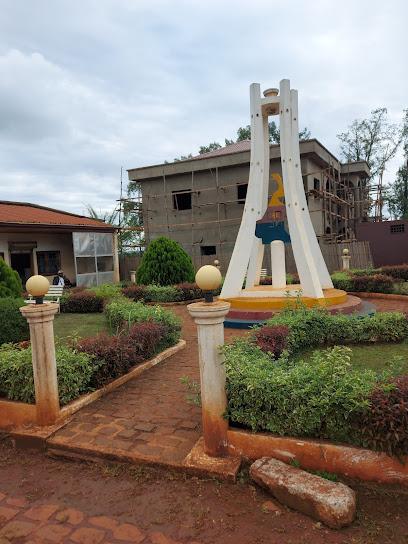
Les Chutes De Tchelepi, Bamougong
Explore the serene beauty of Les Chutes De Tchelepi, a breathtaking waterfall in Bamougong, perfect for nature lovers and adventure seekers.
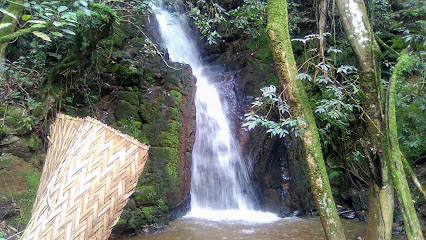
Espace vert d'amendoc
Discover tranquility and natural beauty at Espace Vert d'Amendoc, a serene park in Bamenda, perfect for relaxation and cultural immersion.
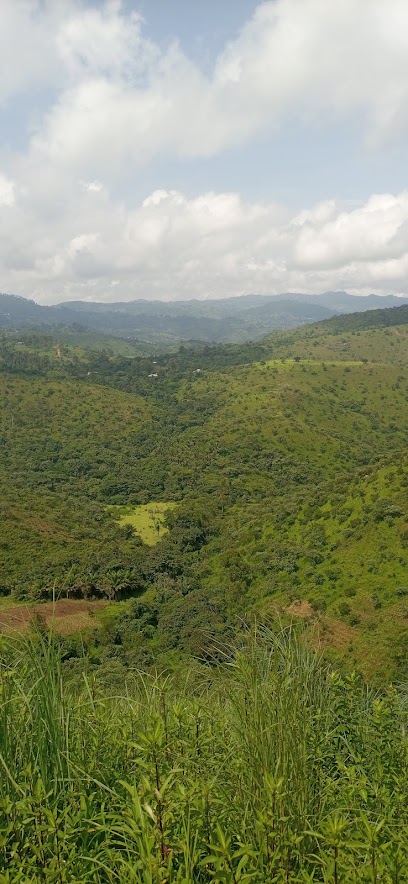
Mmuock Leteh Welcome
Discover the rich culture and breathtaking landscapes of Mmuock Leteh Welcome in Ntemndzem, Cameroon, a hidden gem for adventurous travelers.
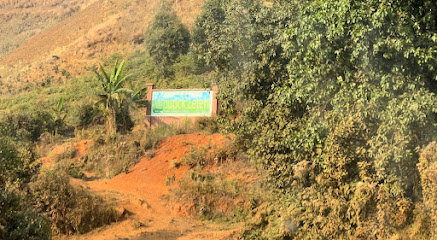
Meloonbua Waterfalls, Bamougong
Explore the breathtaking Meloonbua Waterfalls in Bamougong, a hidden gem for nature lovers and adventure seekers in Cameroon.
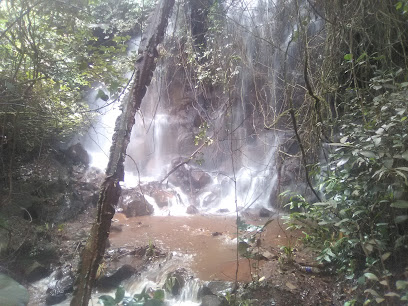
Jua-jua waterfall
Experience the breathtaking beauty of Jua-Jua Waterfall in Santa, an enchanting natural escape perfect for nature lovers and adventure seekers.
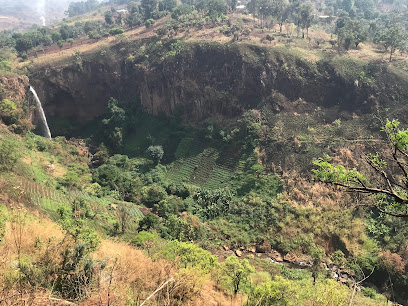
River Alalange
Experience the tranquil beauty and cultural richness of River Alalange in Bamukumbit, a must-visit destination for nature lovers and adventurers.

public Garden
Explore the lush landscapes and tranquil beauty of Mbouda Public Garden, a serene escape in Cameroon, perfect for relaxation and exploration.
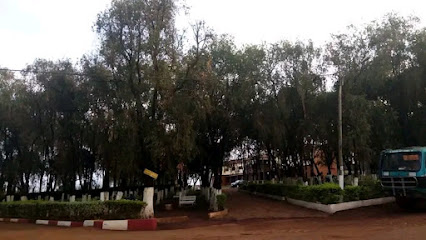
Kilobi dans danengo
Explore Kilobi dans Danengo in Bafoussam, a captivating tourist attraction showcasing Cameroon's natural beauty and rich cultural heritage.

NTACCUL (UP-STATION BAMENDA)
Explore the vibrant NTACCUL at Up-Station Bamenda, a cultural gem offering authentic local experiences, crafts, and flavors in the heart of Cameroon.
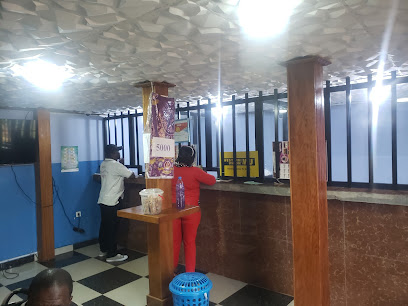
Forêt Galerie de Twometa, Bamougong
Discover the serene beauty and diverse wildlife of Forêt Galerie de Twometa, a national forest paradise in Bamougoum, Cameroon.
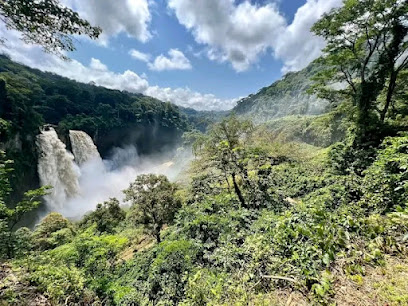
Touo Messo'o
Explore the serene beauty and rich culture of Touo Messo'o in Bafou, a captivating tourist attraction in Cameroon.

BASE RAZEL DE BAMESSO
Explore the serene beauty of Base Razel de Bamesso, a tranquil park in Mbouda offering lush landscapes and a peaceful escape into nature.

Bamelo Wakaman
Experience the serene beauty and cultural richness of Bamelo Wakaman in Bafou, Cameroon, a hidden paradise for adventurous travelers.

Essential places to dine
Restaurant La Saladière
Discover authentic Cameroonian cuisine at Restaurant La Saladière in Mbouda – where flavor meets affordability.
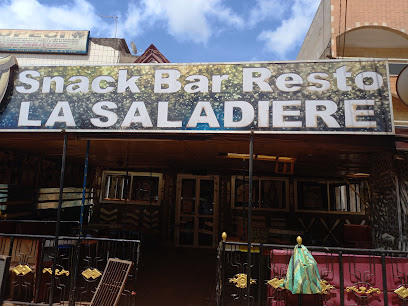
Café Restau Italien
Experience authentic Italian cuisine at Café Restau Italien in Mbouda - where every meal feels like a celebration.
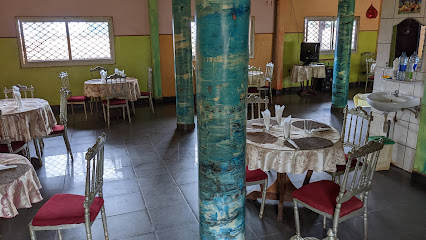
Restaurant Merlo, Mbouda
Experience authentic Cameroonian cuisine at Restaurant Merlo in Mbouda—where every meal is a celebration of flavor and culture.
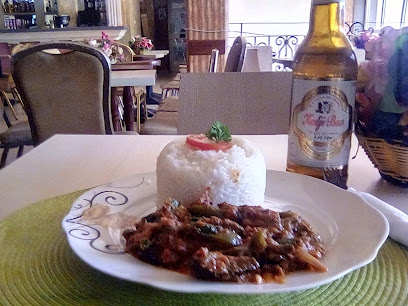
Restaurant BLACK & WHITE
Savor authentic Cameroonian cuisine at Restaurant BLACK & WHITE in Mbouda – where every meal is a celebration of flavor.
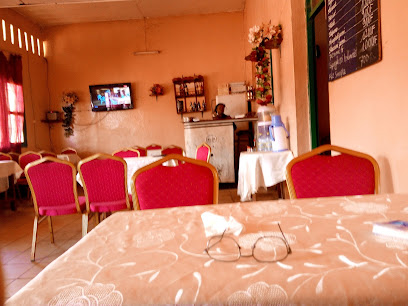
Restaurant Le Progrès
Discover authentic Cameroonian flavors at Restaurant Le Progrès in Mbouda—where every meal tells a story.
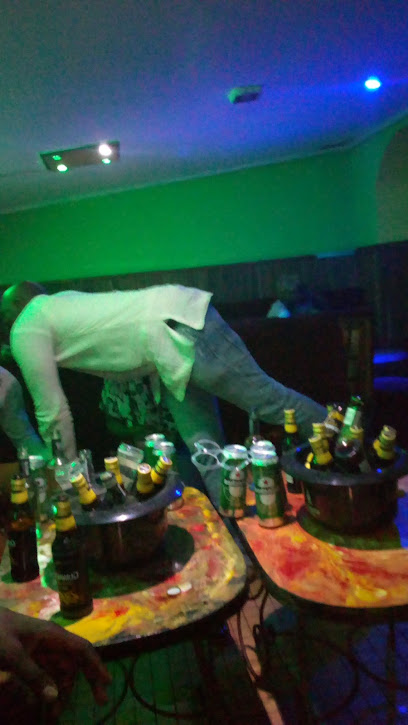
CARREFOUR BAKASSANG
Experience authentic Cameroonian cuisine at Carrefour Bakassang in Mbouda, where every dish tells a story.

Café-Restau-Prospère
Discover authentic Cameroonian cuisine at Café-Restau-Prospère in Mbouda – a delightful culinary experience awaits!
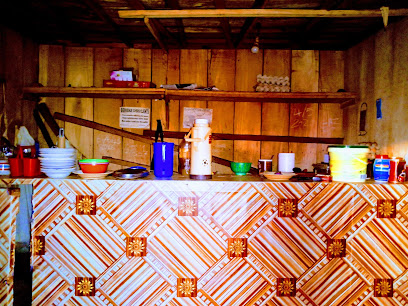
Equity Bar Restaurant, Bamougong
Discover the flavors of Cameroon at Equity Bar Restaurant in Bamougong – where tradition meets taste in every dish.
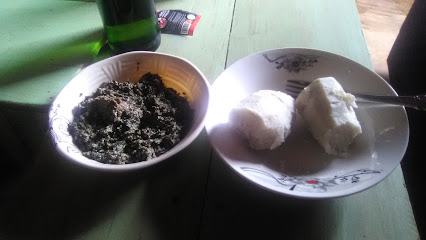
restaurant Le Banick
Experience the authentic taste of Cameroon at Le Banick, where every dish tells a story and every visit feels like home.

Famille TALONWAK SALEMON
Experience authentic Cameroonian culture at Famille TALONWAK SALEMON, a vibrant stand bar in Mbouda offering refreshing drinks and local charm.

Restaurant mère Élise
Experience authentic African cuisine at Restaurant mère Élise in Mbouda—where every dish is a journey through rich cultural heritage.

Island Restaurant, Mbouda
Discover authentic Cameroonian cuisine at Island Restaurant in Mbouda – where every dish tells a story of flavor and tradition.

Claude
Experience authentic Asian flavors at Claude in Mbouda, where every dish tells a story of culinary tradition and creativity.

Chez TSAPO
Experience authentic Cameroonian nightlife at Chez TSAPO in Mbouda, where vibrant atmosphere meets local culture.
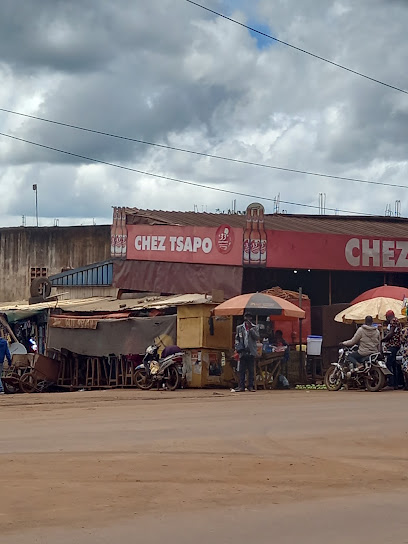
Restaurant Universel, Mbouda
Savor the essence of Cameroon at Restaurant Universel in Mbouda—where authentic flavors meet warm hospitality.
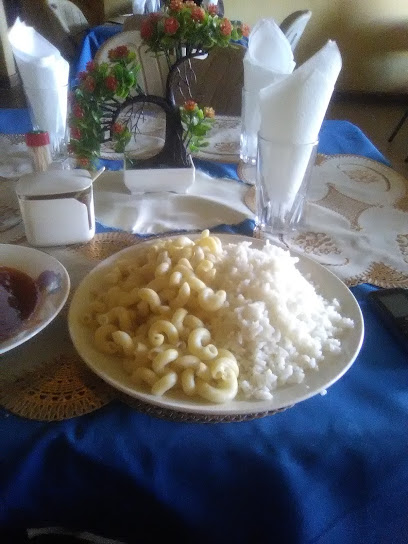
Markets, malls and hidden boutiques
Marché Mbouda
Explore the lively Marché Mbouda, a vibrant market that showcases local culture, fresh produce, and unique crafts in the heart of Mbouda.
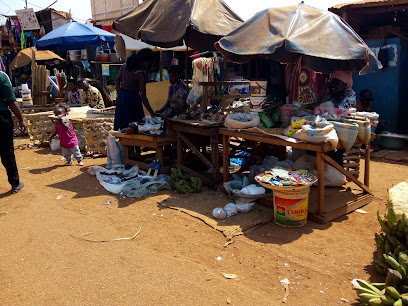
boulangerie Sik
Discover the irresistible flavors of Cameroon at Boulangerie Sik, a bakery in Mbouda offering fresh pastries and local delights.
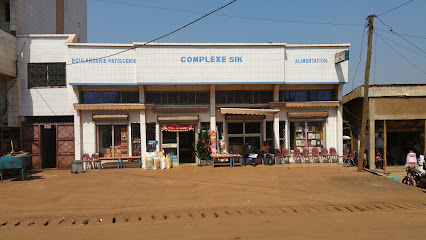
Merlo SARL
Experience the rich shopping culture of Mbouda at Merlo SARL, where local products, delicious food, and entertainment await every visitor.
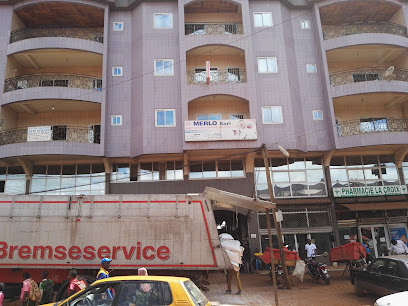
Complexe Sik
Discover the vibrant shopping scene at Complexe Sik in Mbouda, a perfect blend of local culture and modern retail experiences.
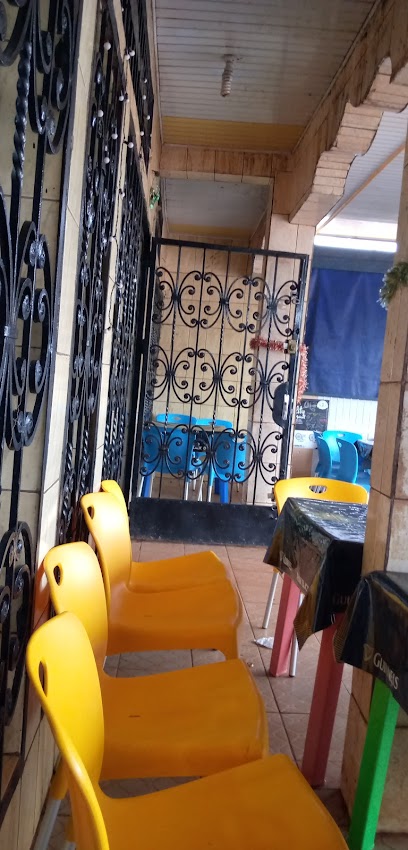
CARREFOUR TEXACO, Mbouda
Discover Carrefour Texaco, a bustling truck stop in Mbouda, offering essential services and a taste of local culture 24/7.
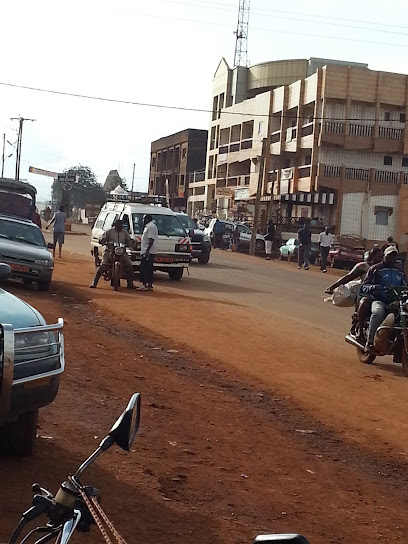
Carrefour Bamesso, Mbouda
Experience authentic Cameroonian culture and cuisine at Carrefour Bamesso, a dynamic truck stop in Mbouda, perfect for travelers and locals alike.
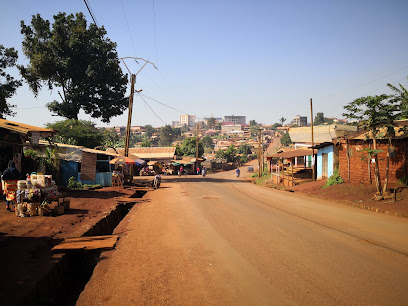
TEHT MONTCHIO
Discover the vibrant shopping experience at TEHT MONTCHIO in Mbouda, where local craftsmanship meets modern retail in a lively atmosphere.
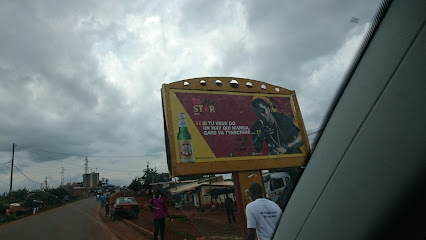
POISSONNERIE CONGELCAM, Mbouda
Explore the rich seafood offerings at Poissonnerie Congelcam in Mbouda, where freshness meets local culinary traditions.
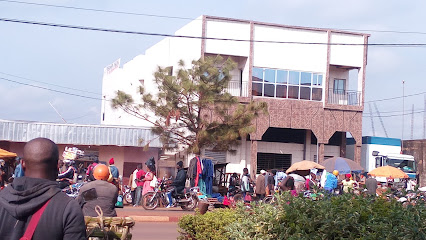
Galaxy Building Sarl
Explore Galaxy Building Sarl in Mbouda for top-notch hardware supplies and exceptional customer service for all your DIY and building needs.
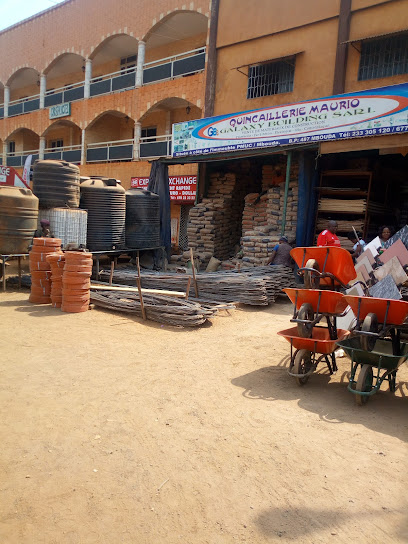
CARREFOUR MADO
Experience the vibrant charm of CARREFOUR MADO, a delightful truck stop in Mbouda, where local culture meets hearty cuisine.
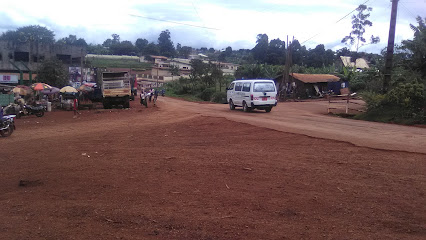
Carrefour De L'unité
Discover the charm of Carrefour De L'unité, a lively truck stop in Mbouda, offering local cuisine and a warm atmosphere for travelers.
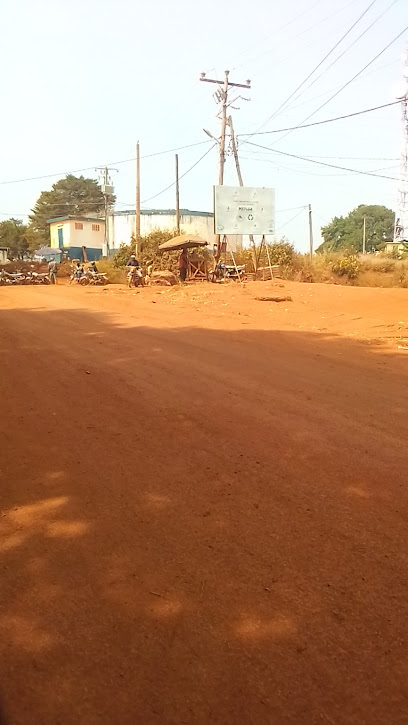
Alkanges-Network
Discover a vibrant shopping experience at Alkanges-Network in Mbouda, featuring local brands, diverse dining, and a welcoming atmosphere.

Rond-point Central, Mbouda
Discover the vibrant culture and delicious local cuisine at Rond-point Central, the bustling truck stop in the heart of Mbouda.
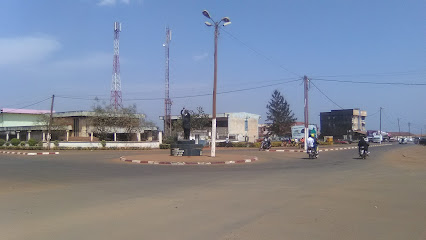
SOMECAM SARL
Explore SOMECAM SARL in Mbouda for a comprehensive range of hardware supplies, expert advice, and exceptional customer service.
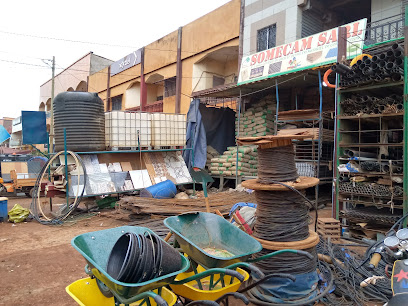
Carrefour Samuel Eto'o Fils, Mbouda
Experience the vibrant atmosphere at Carrefour Samuel Eto'o Fils, a unique truck stop in Mbouda, blending convenience with local culture.
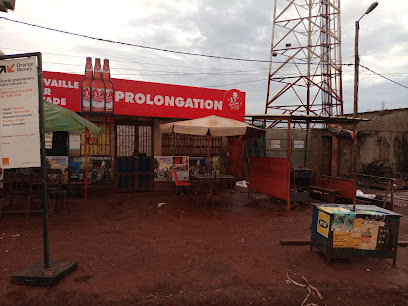
Essential bars & hidden hideouts
Parc Des Princes
Discover the vibrant ambiance of Parc Des Princes in Mbouda, a perfect bar to unwind and enjoy local drinks amidst a lively crowd.
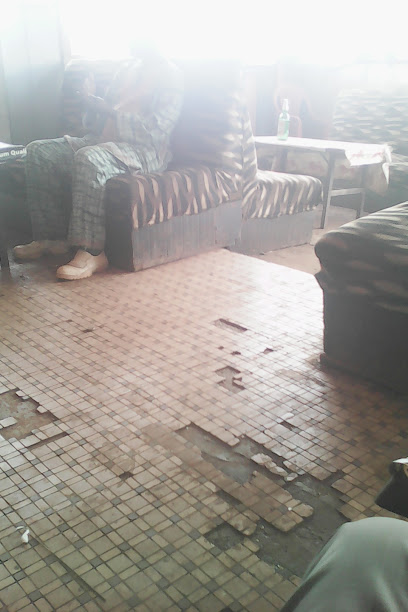
VIP
Discover the vibrant nightlife at VIP Bar in Mbouda, where locals and tourists mingle over drinks in a lively atmosphere.
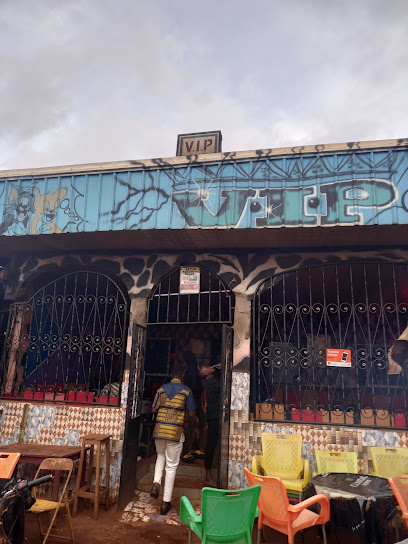
Hôtel Universel
Experience the vibrant spirit of Mbouda at Hôtel Universel, a local bar where drinks and camaraderie flow freely.
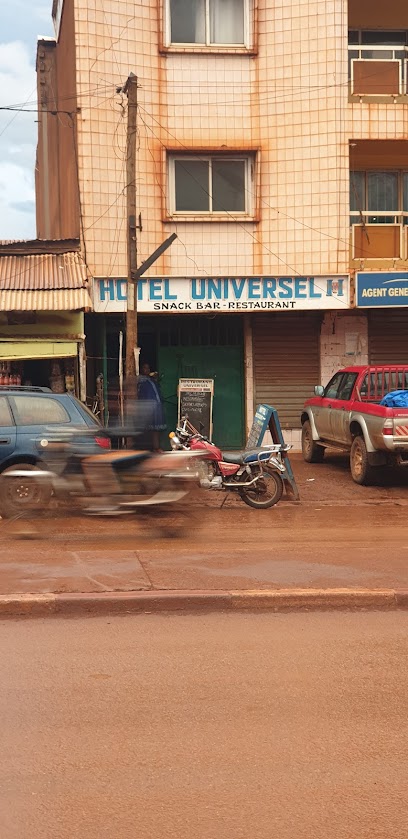
DÉPÔT SONAVEL
Discover the lively spirit of Mbouda at DÉPÔT SONAVEL, a bustling bar serving local drinks in a warm and inviting atmosphere.

CARREFOUR ERNEST
Discover the lively atmosphere of Carrefour Ernest, a bar in Mbouda perfect for enjoying local drinks and vibrant nightlife.

Equity Bar Restaurant, Bamougong
Experience the rich flavors of Bamougong at Equity Bar Restaurant, where local cuisine meets delightful ambiance.
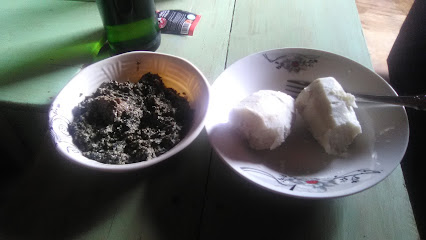
CENTRE D'EMBALLAGE SONAVEL
Experience the vibrant atmosphere of Centre d'Emballage Sonavel, a local bar in Mbouda where culture and relaxation come together.

Fontaine Bar
Discover the vibrant spirit of Cameroonian nightlife at Fontaine Bar in Mbouda, where every drink tells a story.
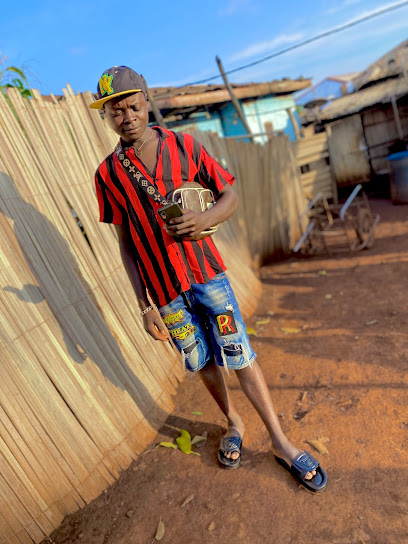
Wifi Bar de l'An 2000, Mbouda
Discover the vibrant nightlife at Wifi Bar de l'An 2000 in Mbouda, where local culture meets modern comfort in a relaxed setting.
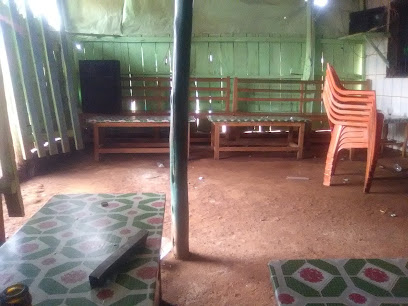
Chez TSAPO
Experience the vibrant nightlife and local culture at Chez TSAPO, the heart of Mbouda's social scene.
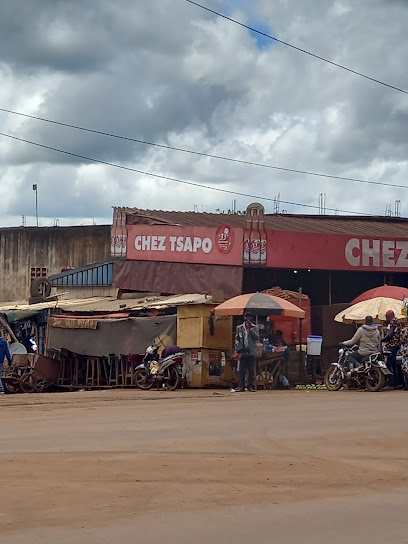
Mbougong
Discover Mbougong: A Vibrant Bar Experience in the Heart of Mbouda, Where Local Culture Meets Lively Nightlife.

Le Phoenix
Discover the vibrant nightlife at Le Phoenix in Mbouda, where local flavors and culture blend seamlessly in a welcoming bar atmosphere.

DÉPÔT GUINNESS
Experience the vibrant atmosphere and local flavors at Dépôt Guinness, Mbouda's premier bar for relaxation and socializing.

BLANCO
Experience the vibrant nightlife at BLANCO, a lively bar in Mbouda where local culture meets great drinks and friendly faces.
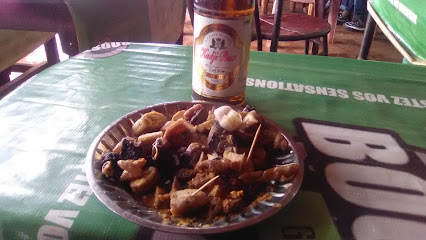
Local Phrases
-
- HelloBɔnswa
[bon-swa] - GoodbyeEtei
[eh-tay] - YesIi
[ee] - NoIyo
[ee-yo] - Please/You're welcomeS'il vous plait
[see-voo-play] - Thank youMese
[may-say] - Excuse me/SorryPardon
[par-don] - How are you?O tondi?
[oh tond-ee] - Fine. And you?Nga nesi. O tondi?
[nga nay-see. oh tond-ee] - Do you speak English?O boli tonge anglis?
[oh boh-lee tong-ay an-glees] - I don't understandNgakam tondi
[nga-kam tond-ee]
- HelloBɔnswa
-
- I'd like to see the menu, pleaseNgai nese ke bɔbɔ, s'il vous plait
[ngai nay-say kay bo-bo, see-voo-play] - I don't eat meatNgakam nesi ɲama
[nga-kam nay-see nya-ma] - Cheers!Nga bese!
[nga bay-say] - I would like to pay, pleaseNgai nese ke tɔ, s'il vous plait
[ngai nay-say kay toh, see-voo-play]
- I'd like to see the menu, pleaseNgai nese ke bɔbɔ, s'il vous plait
-
- Help!Nga bɔbɔ!
[nga bo-bo] - Go away!Wete!
[way-tay] - Call the Police!Bɔsɔlɔ Polis!
[boh-soh-loh poh-lees] - Call a doctor!Bɔsɔlɔ dokte!
[boh-soh-loh dohk-tay] - I'm lostNgai bese
[ngai bay-say] - I'm illNgai bese jɔ
[ngai bay-say joh]
- Help!Nga bɔbɔ!
-
- I'd like to buy...Ngai nese ke...
[ngai nay-say kay] - I'm just lookingNgai bɔbɔ
[ngai bo-bo] - How much is it?Nga nesi ke?
[nga nay-see kay] - That's too expensiveIyo nesi ke bekele
[ee-yo nay-see kay beh-kay-lay] - Can you lower the price?O nese kɔ nɔ
[oh nay-say koh noh]
- I'd like to buy...Ngai nese ke...
-
- What time is it?I tondi ke?
[ee tond-ee kay] - It's one o'clockTɔ iyi
[toh ee-yee] - Half past (10)Kɔkɔtɔ (10)
[koh-koh-toh] - MorningMombɔ
[mom-boh] - AfternoonMɔsɔ
[moh-soh] - EveningNkwe
[ng-kway] - YesterdayMondi
[mohn-dee] - TodayNandɔ
[nan-doh] - TomorrowNembi
[nem-bee] - 1Nyɛn
[nyen] - 2Nna
[nah] - 3Nnɔ
[noh] - 4Nnaa
[nah-ah] - 5Nnɛk
[nek] - 6Nnɔndi
[nohn-dee] - 7Nnɔti
[noh-tee] - 8Nnɔnɛn
[noh-nyen] - 9Nnɔnna
[noh-nah] - 10Nnɔnnɔ
[noh-noh]
- What time is it?I tondi ke?
-
- Where's a/the...?I fe...
[ee feh] - What's the address?I yonde kenɛ?
[ee yond-ay ken-ay] - Can you show me (on the map)?O nese ke nɛse (na map)
[oh nay-say kay nay-say (nah map)] - When's the next (bus)?O nese nɔmɔ (bus)?
[oh nay-say noh-moh (boos)] - A ticket (to ....)Tikɛ (to ....)
[tee-kay (to ....)]
- Where's a/the...?I fe...
History of Mbouda
-
Mbouda, located in the Western Region of Cameroon, was established by the Bamileke people, an ethnic group known for their rich cultural heritage and history. The town was founded in the early 19th century as a center for trade and agriculture, leveraging its strategic position in the highlands.
-
During the late 19th and early 20th centuries, Cameroon was colonized by Germany. Mbouda, like many other towns in the region, experienced significant changes. The German administration introduced new agricultural practices, infrastructure, and a more formalized system of governance. However, this period also saw the imposition of harsh colonial policies that disrupted traditional ways of life.
-
After Germany's defeat in World War I, Cameroon was divided between France and Britain. Mbouda fell under French control, leading to further changes in the town's administration and infrastructure. The French continued to develop the region's agricultural potential, focusing on crops like coffee and cocoa, which remain important to the local economy today.
-
Cameroon gained independence from French colonial rule in 1960. In the ensuing decades, Mbouda evolved rapidly, with increased investments in infrastructure, education, and healthcare. The town became a regional hub, attracting people from surrounding areas and contributing to its vibrant cultural landscape.
-
Mbouda is well-known for its cultural festivals, particularly the annual 'Ngouon' festival, which celebrates the traditions and heritage of the Bamileke people. This festival includes traditional dances, music, and rituals, offering visitors a unique insight into the town's rich cultural fabric.
-
The economy of Mbouda is primarily based on agriculture, with local markets playing a crucial role in daily life. The town's markets are bustling centers where farmers sell produce such as yams, plantains, and maize. These markets are not just economic hubs but also social spaces where the community gathers and interacts.
-
Mbouda features a blend of traditional Bamileke architecture and colonial-era buildings. The traditional structures are often adorned with intricate carvings and serve as important cultural symbols. In contrast, the colonial buildings reflect the town's historical interactions with European powers.
Mbouda Essentials
-
Mbouda is located in the Western Region of Cameroon. The nearest international airport is Douala International Airport, approximately 250 kilometers away. From Douala, you can take a bus or hire a private car to Mbouda. The journey typically takes around 5 to 6 hours by road. Alternatively, you can fly into Yaoundé Nsimalen International Airport and take a similar route to Mbouda.
-
Mbouda is a relatively small town, and many places can be accessed on foot. For longer distances, local taxis and motorcycle taxis (okadas) are readily available and affordable. Buses and minibuses (bush taxis) operate within the town and connect to nearby villages. Renting a car can also be an option, but be prepared for varying road conditions.
-
The official currency in Cameroon is the Central African CFA Franc (XAF). Credit cards are accepted in some hotels, restaurants, and shops, but it is advisable to carry cash, especially for smaller vendors and in rural areas. ATMs are available in Mbouda, but it is wise to withdraw sufficient cash in larger cities like Douala or Yaoundé before traveling.
-
Mbouda is generally a safe destination for tourists. However, like any travel destination, it is advisable to take standard precautions. Avoid walking alone at night in unfamiliar areas and keep an eye on your belongings in crowded places. Some areas may have higher crime rates, so it is best to stay vigilant and aware of your surroundings.
-
In case of emergency, dial 117 for police assistance and 119 for medical emergencies. Mbouda has local police stations and medical facilities. It is recommended to have travel insurance that covers medical emergencies. For minor health issues, there are pharmacies in the town where you can purchase over-the-counter medications.
-
Fashion: Do dress modestly, especially when visiting religious sites. Avoid wearing revealing clothing. Religion: Do respect local customs and traditions. Always remove your shoes when entering religious sites. Public Transport: Do be respectful and give up your seat to elderly passengers. Don’t eat or drink on public transport. Greetings: Do greet people with a handshake, and a smile is always appreciated. Eating & Drinking: Do try local delicacies and accept food offerings graciously. Don’t refuse hospitality, as it is considered impolite.
-
To experience Mbouda like a local, visit the local markets where you can buy fresh produce and traditional Cameroonian goods. Engage with locals, as they are often friendly and willing to share stories about the town's history and culture. Don’t miss visiting the nearby tea plantations and scenic landscapes. For a unique experience, participate in local festivals and cultural events to get a deeper understanding of the community.
Nearby Cities to Mbouda
-
Things To Do in Bafoussam
-
Things To Do in Dschang
-
Things To Do in Bamenda
-
Things To Do in Foumban
-
Things To Do in Nkongsamba
-
Things To Do in Mamfe
-
Things To Do in Bafia
-
Things To Do in Douala
-
Things To Do in Buea
-
Things To Do in Tiko
-
Things To Do in Edea
-
Things To Do in Limbe
-
Things To Do in Calabar
-
Things To Do in Yaoundé
-
Things To Do in Malabo





